
Sense's Reminiscences
by Sense de Jong
- Geurt
- Tante Betje (by Sense)
- Tante Betje (by Truus)
- Miss Roozendaal
- Concert in Winschoten
- A baptism remembered
- My birdhouse
- War veterans
- Henk Smit - bass/baritone
- Stefan
- In memory of Herman - I
- In memory of Herman -II
- Remembering AK
- Our love for music
- Herman - Promoter of Christian Causes
- A Salem evening with Herman de Jong
- From Elsinore to Monschau
- A Danish Treat
- Glimpses of Thuringia and Saxony
- Domie and Hansie
- La Manche, Newfoundland
- Bermuda - Isle in the Sun
- 1932 and 1934
- 1940 - 1945
- Winschoten, Grace on the Venne
- 1948
- Johann Sebastian Bach
- From Generation to Generation
- Seven children and a harmonium
- K.P. - A Man of Enterprise
- Cuba and the tragedy of the MS St Louis
- It all began in Norwich, Ontario
Another site by Sense de Jong:
~ Hinne de Jong ~
A Chronicle
Sites by Henry de Jong:
~ Herman de Jong ~
Memorial
~ Newmaker Notes~
Writings, Pictures, Collections
~ AACS/ICS Niagara Conferences~
1970 - 1991
It's 2014 when I write this. It seems that the older I get the more fascinated I become with what really happened during the Second World War, not only in the Netherlands but in the world. How did I experience the German occupation as a child? Was I in any sense aware what happened around me? What did my parents and siblings and friends know? So, I began writing about this. Most of what you will read I did not know about during the war. Some childhood memories of the war will always be with me. The sound of German boots on the street, the dull roar of the mighty fleets of English or American bombers coming over our house, how scared I was when one day an English Spitfire opened up with every machine gun on board above my head, the day my oldest brother was caught by the Germans etc., that will stay. What follows is my attempt to give our children, grandchildren and great-grandchildren some idea of what happened around us, even though we only learned about these events later in our life.
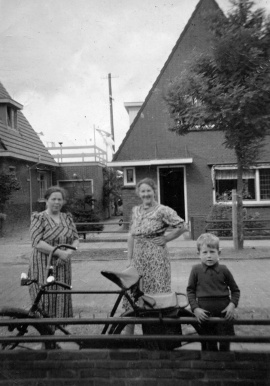
I was almost six years old when, during May, 1940, the Germans crossed the border into Holland. I had an older sister (Truus) and two older brothers (Cees and Herman). Brother Jaap was born during 1943 and sister Hennie in 1945 – one month after the end of the war. Our family lived in the city of Winschoten, located in the eastern section of the province called Groningen. The nearby border town of Nieuweschans (about 15 kilometres to the east of Winschoten) was the obvious entry point for the Wehrmacht. An important highway and railroad connected the two countries there. Only much later did I discover the sinister truth of what all those trains, going right through our city during the war years, were transporting from our country into Germany. (See my "Tante Betje" story - sdj)
.jpg)
What do I remember of the German invasion and of the five years living in occupied Holland? I remember hanging out of our upstairs window on May 10, 1940, because of all the excitement on our street, the Acacialaan. Did people shout things like: we’re at war? They say that the Dutch troops that morning blew up an important bridge crossing the "Winschoter Diep," a canal close to our home. Did I hear the explosion? I don’t remember.
Living in occupied Groningen
Once we got over the fact that Germany had won the war with Holland, we got used to the presence of German troops. They confiscated all kinds of schools and other useful buildings much to the chagrin of the population in our city. I remember German troops marching past our house on the way to an exercise field located at the end of our street. Some of those guys were famished and starting ringing doorbells. They looked like ordinary guys to me. But when my goodhearted mother opened the door and offered them a sandwich, my usually mild mannered Dad forcefully told her, " Wine, you can't do that. Today there are two, tomorrow there'll be twenty!"
Boys will be boys! My buddies and I would often roam around the city. We would put a cent on the railroad track crossing the St. Vitusholt road. Then we hid somewhere and waited for a train, carefully looking out for anybody in a uniform, like a German soldier or a Dutch cop. One day, after we picked up our flattened penny, we heard someone scream, "Halt!" Scared witless, we scattered, probably soiling our pants running all the way home.
Both Herman, my brother, and I had rather dark hair. Herman's hair was pitch black. We were used to being called names on the street. Some boys called us "fienen" because we went to the Reformed Church (Gereformeerde Kerk), rather than the Hervormde Kerk, the old state church. One day during the war, someone on the street loudly called Herman a "jeude" (Groninger dialect for "Jood" i.e. Jew). It happened close to our church on the Venne in Winschoten. At that time we knew very little about the persecution of the Jews in Europe. The Germans were hunting for Jews in Winschoten, too. So when one of those unsavory pro-Nazi characters in our city heard Herman being called this name, he was promptly reported to the Germans. He was taken to the police headquarters located in the downtown market square. Fortunately, our senior pastor, Rev. Berghuis (who lived next to the church), saw all this happen. He immediately reported this to my parents. So, my father went there and told the authorities they were full of beans. They let Herman go. He was then perhaps only about twelve years old!
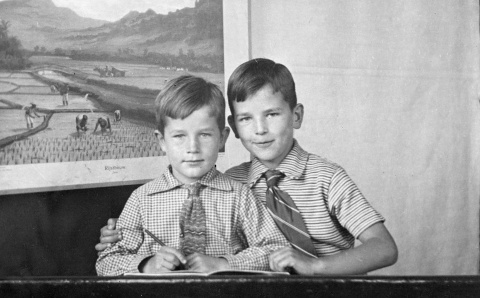
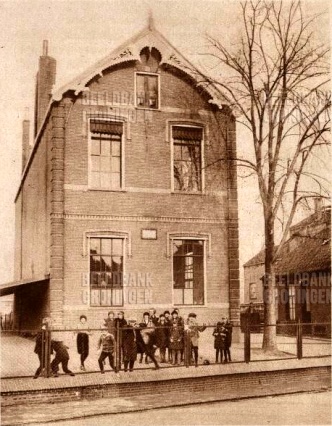
de Jong kids attended this school (or later versions of it).
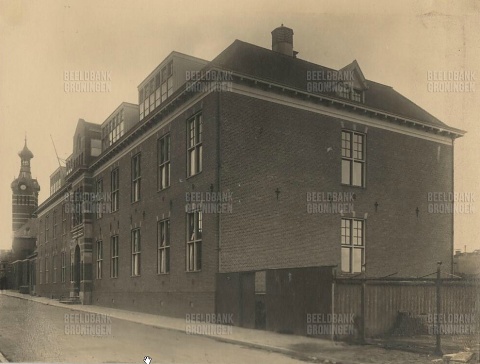
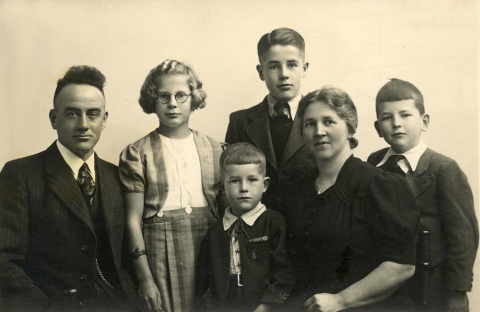
I remember how we were forced out of our school, "Hoogklei," into another school located on the Oudewerfslaan. I remember how we had to remove the rug in our living room and lift up part of the floor and enter the crawl space beneath where we hid things, like potatoes, grain and canola seeds. My father travelled around the province and often came home with much- needed food. He and my older siblings would drag a bicycle into our candle-lit living room. One of the wheels, raised above the floor, would be connected to a machine that converted the canola seeds into cooking oil, which my mother badly needed. I remember sitting on that bike pedaling like crazy in near darkness for a long time. I remember how we were forced to surrender our precious radio to the Wehrmacht (no BBC to listen to anymore).
The Germans set up a program called "Organisation Todt," which used compulsory labour from occupied countries. My father was employed as a supervisor for a Dutch crown corporation. Often he was called upon to oversee a certain work project which required field labourers. One day, the Germans ordered such a group to dig defensive holes ("putten") along important roads leading into our city. A company official "rescued" them, convincing the Germans these men were required elsewhere on essential projects. Later on in my life I got to know quite a number of men who, under the Todt program, had been forced to toil in German war factories for years. They came back, but many such men did not survive to tell about it.
I remember how important it was never to turn the light on in any room that had no drapes. We would hear the Germans scream "Licht Aus!" whenever Allied bombers came over our city, which was often. So, every evening we had to darken every window in our house. I remember standing in darkness on our flat roof, in the back of our house, gazing in awe at the large fleets of bombers coming from the west and the always-moving beams of the searchlights in the eastern sky over the nearby German cities of Emden and Bremen. Those beams were trying to get a fix on these planes and bring them down with German anti-aircraft guns. Today, I can still hear the drones of all those planes coming over our house at night....
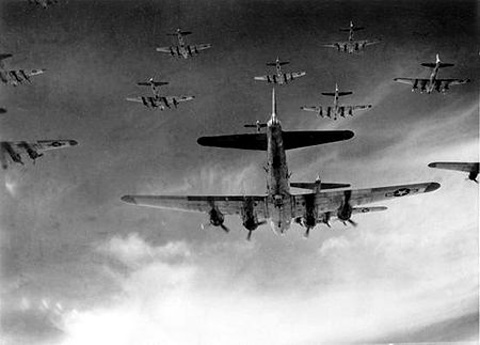
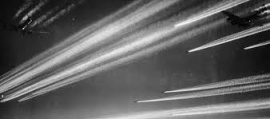
Razzia!
One Sunday morning during the war I did not go to church with the family. Since I was ill, my sister Truus stayed home with me. That morning the Germans organized another "razzia" (police raid) in our city in the hope of rounding up eligible men who had not obeyed the order to report for work in German factories. They crept up to the "Vennekerk" (our church) during the morning service, surrounded the church and loudly announced their presence. Later, I heard that our faithful caretaker quickly made a pre-arranged signal to our pastor, Rev. J.R. Hommes. Our pastor jumped off the pulpit and made a fast getaway over the fench into the small streets behind the church property. The men flew in all directions in the church, hiding in almost impossible places. Three men hid in the church's belfry but were never found. But some, including my oldest brother, Cees, were caught and were transported to our province's capital city, Groningen. My brother was about 15 or 16 years old at that time. That was perhaps the reason the Germans let him go. What a relief when he came home, safe and sound! Recently I learned that the father of Herman's future wife, Harm van der Laan, was also taken because he lacked proper identification papers. Mrs. Van der Laan subsequently pedaled all the way to her home in Blijham, a village near Winschoten, and picked up the ID documents. Her husband was released!
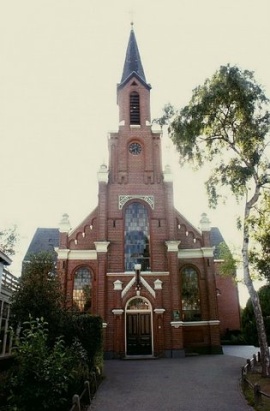
What did I know during the war about the people involved in the Dutch Resistance? I had no clue what was being done for the Jews who were in danger of being transported to the gas chambers of Auschwitz/Birkenau or some other evil camp. We were visited regularly by our "grocer" who would bring us certain groceries my Mom had ordered. His name was Ruurd de Bruin, and I clearly remember him. His brother was a well-known person in the Resistance in northern Holland. I heard later that on a certain day the Germans searched all over the area to find him. They did find a de Bruin, but it wasn't him, it was his brother, our grocer. They arrested him and began to interrogate him. While driving through the country, they stopped the car and told de Bruin he could go. De Bruin stepped out of the car, walked into a field, thinking he was free. But the Germans shot him there on the spot!
Our next door neighbour disappeared. Being of German background, he was conscripted into the German Army. Last thing we knew was that he died on the Russian front. Our neighbour, across the street, was "impure" i.e. a member of the hated NSB (Nationale Socialistische Beweging) – an organization supportive of the Nazis. Its members were assisting the Germans with information about the whereabouts of members of the Resistance, the people who were hiding Jews, or Dutch citizens who helped escape the crew members of downed Allied bombers. Many such bombers suffered gun damage after returning from raids over Germany and crash- landed in northern Holland.
A citation
During the war, Corrie's family lived in Surhuisterveen, in the province of Friesland. At that time they went to the old "Dellen Gereformeerde Kerk" on the outskirts of the village. It was much later before I learned that quite a few disabled, crippled bombers, returning from Germany , crash-landed in pastures in northern Holland. Corrie's father was part of a group of people who would jump into action whenever they heard that survivors of downed bombers needed hiding places, medical help and/or aid in getting them back to England. These people always lived in fear of being betrayed by local villagers who were members of the NSB. Anyone familiar with that part of Friesland knows that a notorious NSBer lived near Surhuisterveen during the war years. The Smit family never trusted him.
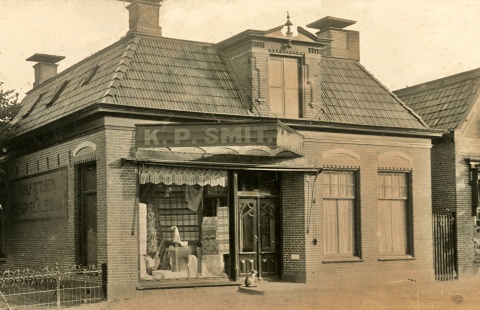
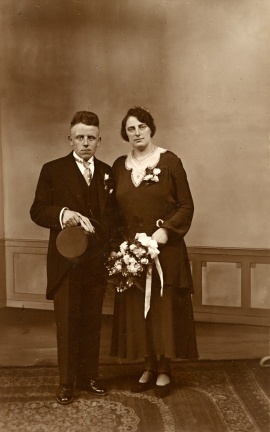
My wife and I have in our possession a citation in which the Embassy of the United States expressed gratitude, on behalf of the people of the United States, to Mr. K. P. Smit (Corrie's father) "for your aid to our airmen who fell in the Netherlands during the period of hostile occupation." The citation, dated July 1, 1946, signed by Frank M. Johnson, Office of the Military Attache to the Netherlands, The Hague, The Netherlands, ends with the statement: "Your admirable and effective cooperation in lending a helping hand to men of our country during moments of crisis, and your loyalty to the cause of freedom, have earned for you both our respect and our grateful recognition."
My wife, Corrie, has her own memories of the war in Surhuisterveen. She told me that her neighbour, Taeke Schuilenga, was shot without trial. He, too, was active in the Resistance the villagers learned later. She explained to me that her home was located behind the well-known K.P. Smit dry goods store in the middle of Surhuisterveen. Her Dad and Mom operated the store. Several young women would help out when it was busy or to do some housecleaning. Corrie remembers at least two hiding places in the big house. But she was supposed to keep mum about that. It is likely that father Smit hid some of the crew members of crashed planes in there. As always, the sneaky NSB character sniffed around. He once warned Corrie's Dad, "Smit, I will get you one of these days." Perhaps, Corrie said, that was the day my Dad went into hiding. He didn't come home at night anymore. In those scary days, news was spreading that the Germans would organize a razzia (raid) to find men suitable for work in German war factories. One evening, Corrie's Mom told everyone in a hushed voice to pick up their pillows and follow her outside into the dark. She was afraid the German police were after her husband. The three girls and one boy with their mother walked furtively through some back streets and lanes to a "safe" house on the outskirts of the village.
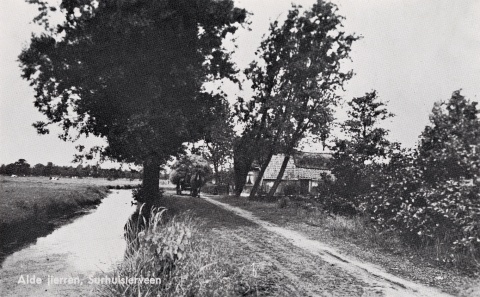
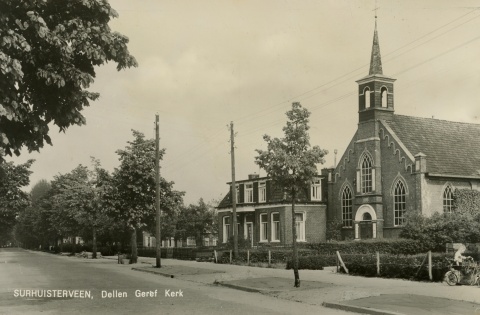
Looking to the skies
During the late 1990s, an elderly friend gave me an important book entitled, "Met de blik naar boven" (translation: (With an Upward Glance), written by a Mr. M. Huizinga. The title is an obvious reference to the attitude many Netherlanders had, often looking "upwards" to the American, Canadian and English fleets of bombers crossing our country on the way to enemy targets. With so much power in the air, liberation would come soon, we thought!
The book documents the events from 1939 to 1945, focusing particularly on the happenings in the province of Groningen, but also mentioning important developments elsewhere in Europe and in the world. This book of remembrance was initially given to a Canadian officer who helped liberate the city of Groningen. Someone wrote on the first page: "Gift of Groningen Council May 1945 to Lt. Col. R.A. Rodgers, HQRCA, 5th Can. Armoured Division, in Groningen, April – Dec. 1945." The fact that the book is entirely written in Dutch is probably the reason why Lt. Col. Rodgers returned it to family members of my friend who must have known the officer during the 1945 liberation of Groningen. In any case, it ended up with me via my friend.
Huizinga, the author, worked some seven years on this 300-page book. The title is a bit deceiving in that it reveals too little in comparison with the book's contents. It has become far more than the story of the air-war over the relatively small area of two northern provinces of the Netherlands. Much attention, for example, is paid to the liberation of the city of Groningen. Approximately 60,000 soldiers – mostly of Canadian origin and divided over four divisions – were involved in the battles in this area around this city. Some 150 pages are devoted to a description of important events in the war that, in the Netherlands, started in May 1940 and ended with the German capitulation in May 1945.
What follows is my translation of a selection of Huizinga's descriptions of important events during the years 1942 and 1943.
July 14, 1942 The unthinkable has started: the first transport of Jews has left for Poland. This transport is the result of large-scale razzias in Amsterdam. The first train, with a total of 1137 Jews, travels from Amsterdam via Assen to the Onnen shunting yards, then turns via the Oosterpolder (close to Groningen) to Waterhuizen. From there (via Winschoten) to the German border (at Nieuweschans) for the horrible trip to "end station" Auschwitz.... Until September 1944 more than 90 (ninety!) such death trains filled with Jewish fellow citizens will make this trip, always passing close to Groningen city.
Nov./Dec. 1942 All Jews from the city of Groningen, except for the really sick, have been transported to Westerbork – a "Durchgangslager" or transit camp – from where they will be deported to Poland. Some will be sent to Vught (a concentration camp in the south of Holland). Very few will ever see Groningen again. The majority of more than 3000 Jews from Groningen will end up being murdered in the German gas chambers. Less than 200 will return to Groningen after the war. Unimaginable and too horrible for words! Nearly 800 homes that belonged to Jewish families will be emptied. They are then made available to NSB-ers and other pro-Nazis.
April 19, 1943 Revolt in the Jewish ghetto in Warsaw, Poland.
April 28-29, 1943 The Germans begin a large-scale operation of laying minefields by the Dutch and German "Wadden" islands.
(Note: A brother of my Dad, Oom Tjebbe, lived on one of these islands: Terschelling, birthplace of the de Jongs. He was a farmer. He had a horse and a a three-wheeler. The story goes that one of those mines had ended up on the beach somewhere. My uncle was ordered by a junior German officer to get over there and load that mine on his wagon. My uncle refused and was taken to the German commandant in charge. Surprise: that commandant promptly started berating his junior for forcing my uncle to come even close to a live mine! The mine was disarmed by the Germans and only then did Oom Tjebbe agree to transport the mine to safe grounds. - sdj)
April 29. 1943 Close to 300,000 Dutch soldiers – who in 1940 were demobilized and went home -are again forced into captivity by the Germans. This decision results in a general unorganized resistance. The uproar reaches the boiling point resulting eventually in the April/May general strikes of 1943.
May 16-17, 1943 The Royal Air Force destroys the Mohne/Eder river dam led by the legendary Guy Gibson.
May 21, 1943 At around 1300 hrs. U.S.A.F. Bombers attack Emden and Wilhelmshaven. Some B-17 Flying Fortresses crash near Vlagtwedde and Drieborg
May 23, 1943 Wehrmacht train near Winschoten is attacked by British aircraft.
(Note: Perhaps this is the day I got the scare of my life. I was nearly nine years of age and was playing on my street in nice May weather one day when, all of a sudden, one or two very fast planes started blasting away with their guns right above my head. A whole pile of cartridges – about 6 or 8 inches long - fell around me, but I never got hit by any of them. I beat it out of there and made it home. If they were Spitfires they were opening up with all of their four Browning machine guns, shooting up a train to the west of our home, and then blasting away at a Gestapo building next to the canal just to the east of our street. - sdj)
June 8, 1943 More shocking sad news! The 65th train has departed from Westerbork to Poland. On this freight train are 3020 Jews, including 1058 children. As always, the train follows the route to Onnen`s shunting yards. Haren, Oosterpolder, Waterhuizen, Hoogezand, Zuidbroek, Scheemda, Winschoten to Nieuweschans. Once across the border, the "Deutsche Reichsbahn`` takes over from the Dutch . Especially in Hoogezand and Winschoten people regularly find little letters along the railroad tracks. They are the last messages from the poor people packed like sardines in these freight trains....
June 29, 1943 Close to Heiligerlee (near Winschoten) a train is attacked from the air killing the engineer. Also: A fire breaks out in the `Harmonie`concert hall in Groningen city.
July 9-10, 1943 "Operation Husky," the greatest invasion ever has started. The Allieds land in Sicily in Europe`s "soft belly" The First Canadian Armoured Brigade and the First Canadian Infantry Division are among the landing troops. It`s a milestone in history. Europe is being liberated! Also today ....fruit and vegetables are being rationed.
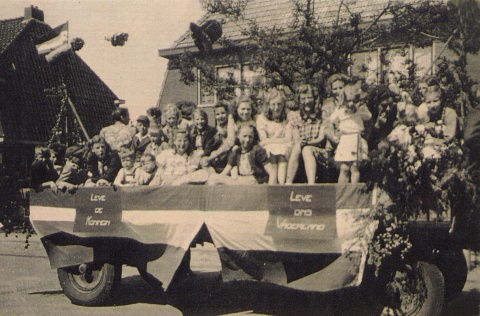
**************
In recent years, my wife and I could not help but become somewhat familiar with the whole debate about creation, science and God. Two books from the Netherlands touched us deeply. They were written by a brillliant man, yet humble child of the Lord. He, Dr. Arie van den Beukel, is a Professor in Physics at the Technical University of Delft, the Netherlands.
His 1990 book, "De dingen hebben hun geheim...gedachten over natuurkunde, mens en God," (All things have their secrets ... thoughts about physics, man and God) went through sixteen reprints. A follow-up book, in 1994, also became a bestseller. I would like to quote a little piece from his first book. It really speaks to me: I could be him. He recalls an episode during WWII when he, about the same age as me, sits in a room full of kids awaiting his class to begin. He shows what he and his classmates experienced to be in the presence of a true believer who is totally dependent on God, Who created this world, time and space, and revealed His love by giving us His Son, Jesus, as an offering for us all. Here is that little story:
Meester (pronounced as "may-ster)
He was a teacher (a young person in Holland would call a male teacher "Meester," in English "Master" – sdj). Meester was also the principal of the Christian elementary school "Groen van Prinsterer" in our city (Delft). A man with a military bearing, including a moustache and with eyes that demanded obedience. He was strict when needed. But he could be mild, too. My feelings for him could becompared with what Christians call ‘the fear of the Lord,’ i.e. love mixed with awe. He was also a righteous man. Twice he removed me from the school because of my having misbehaved. There was very little one could do about it, I simply deserved it. When we left this school he shook hands with all of us. He knew that I would be the only one who would go to the "gymnasium.," a more advanced form of high school. In our circles, wanting to go to such a school was being somewhat pretentious. You shouldn’t be that proud. Pride was lying in wait, it was thought. Meester said: "Will you remain humble, jongen (boy)?" and he squeezed my hand almost into pieces. I will never forget one day in the school year 1943-1944. The Netherlands suffered under the yoke of the Nazi oppression. One morning, upon entering the classroom, we found Meester bowed down behind his lectern. He was crying! Tears streamed down his face. Shyly, as though hit by lightning, we sat down in our seats. We observed what we saw with unbelieving eyes, something that was not possible. After a while Meester started to speak even though he kept on crying. He explained, by fits and starts, that his son had participated in a resistance action against the hated Germans. His son had been caught and was executed forthwith. It had happened the day before. The young man did what he had vowed to do. There was no other way than to resist. His father, Meester, was proud of him. After he calmed down a bit, Meester straightened his back, went to the chalkboard with a a piece of chalk and said: "Write this in your notebooks." With firm strokes, writing in the beautiful style we were so used to, he wrote: Jezus ga ons voor (Jesus lead us on our way) deze wereld door (through this world) en u volgend op uw schreden (and following in Your footsteps) gaan we moedig met u mede ( we bravely go along with you) Leid ons aan uw hand (Lead us by Your hand) Naar het Vaderland (to the Fatherland). Three stanzas followed. Below the fourth stanza he wrote: "Most beloved song of my son Folkert, executed by the German occupiers of our land…" He then asked us: "Let us, together, sing these stanzas."
[an error occurred while processing this directive]